
We spend a moment talking with Dr Billie Bonevski, who has this week joined Flinders University as the Discipline Group Lead of Public Health and Discipline Lead of Public Health. A behavioural scientist and public health researcher of international reputation who was previously at the University of Newcastle, she is passionate about using research evidence to tackle chronic diseases and health inequities.
What is your role and what does your work focus on?
I’ll be working with the team in public health to continue building a strong public health education and research hub at Flinders. I also hope to facilitate many collaborations within and outside SA. Coming from NSW and currently collaborating with partners in Victoria and Queensland, I’ll be bringing some with me. I’ll also engage with the local community to better understand its needs. I see so much potential in public health at Flinders with strengths in such areas as rural and remote health, Aboriginal and Torres Strait Islander health, and equity and the social determinants of health. It’s a solid platform for continued growth and to ensure that what we do is meaningful for the community. I feel very privileged to have be given this opportunity to work with great people.
What interests you most about public health?
The great thing about public health is that it has a big impact on so many people – the health of the whole population. The focus on preventing the onset or worsening of disease, and promoting health is very satisfying. With the current COVID-19 pandemic, we’ve seen that public health has been the key driver of keeping Australians well. Alternatively, we’ve seen in other countries that not following public health advice has had devastating consequences. As a discipline to study or practice, public health is so diverse, with so many methods and strategies for promoting health at a population level. One of my particular areas of interest is health equity and a lot of my research is focused on population subgroups that may be at greater risk of disease, and working with those communities on ways to stay healthy.
What journey has led you to this point in your career?
My background is in psychology, and then I moved to the Faculty of Health and Medicine at the University of Newcastle to complete a PhD in health behaviour science. The field suited me because it’s very applied and I’m a practical person. I like to develop and evaluate programs that tackle the biggest diseases in Australia – chronic diseases like cancer, cardiovascular disease, diabetes and respiratory disease. These all share common health risk behaviours like smoking, harmful alcohol use, poor nutrition and a sedentary lifestyle. I really enjoyed the research and have remained in a predominantly research role for most of my academic career. I’m fortunate to have had a few research fellowships as a mid-career researcher and more recently have been involved in roles with a greater emphasis on research leadership and university-wide equity, diversity and inclusion initiatives. I was the University of Newcastle’s inaugural Women in Science Chair and I chaired the university’s Athena SWAN working group, implementing actions to promote gender equity in the university – so there was a lot of overlap in my work on health equity and gender equity. To be honest, I’ve never had a firm career plan. I’ve just been doing the best job I possibly can.
What is something you are most proud of?
I’m proud of my family. My husband and I have raised two very thoughtful, smart, funny, totally normal young men. I have a lot of pride in my work and it’s difficult to select only one outcome. For example, early in my career as a postdoctoral researcher, I developed the first needs assessment tool for people with cancer. Up to that point, no one had thought to ask people going through cancer treatment what their unmet needs are. This work has led to the development of many programs to improve the health and wellbeing of cancer survivors, and the needs assessment tool has been translated into 11 languages including one Indigenous Australian language. More recently, one of my projects has involved developing a health behaviour change online program for stroke survivors. Our trial has found that it was effective at improving health related quality of life for people who used it, which is really rewarding. I also do a lot of tobacco smoking cessation research and with partners like state Cancer Councils we’ve had our programs rolled out through homelessness, mental health and drug and alcohol services, where smoking rates are through the roof. Before our programs, clients received almost no support to quit smoking, but now they do. Some people are so grateful for the help that I’ve had notes, songs and poems of thanks sent to me. That’s really humbling, but it also makes me determined to keep going. I’m also very proud of the gender equity work I did at Newcastle. We were able to change policies and practices to make the university more inclusive and we created fellowships and PhD scholarships for women to improve equity.
How do you like to relax or spend your spare time?
Most of my spare time is spent with my family. We love the outdoors, especially the beach, and we’re very active. Both my boys have been keen soccer players, so I’ve been driving them to training four evenings a week and going to games on both Saturdays and Sundays. I run or walk most mornings and feel it’s the best way to start the day. When I get the time, I love to read novels, see movies, and spend time with friends. Before COVID-19, we used to travel a lot, too.

